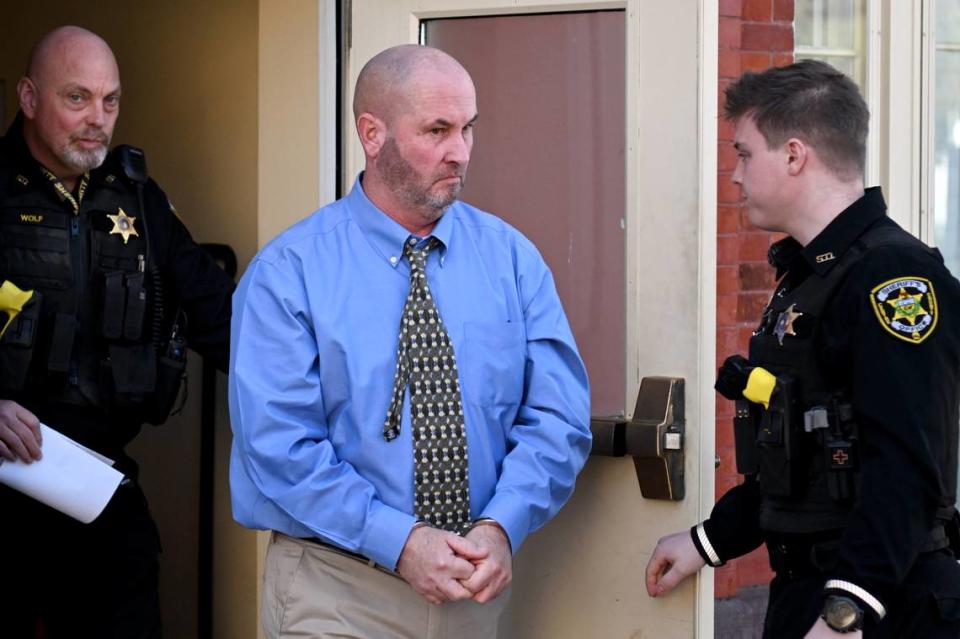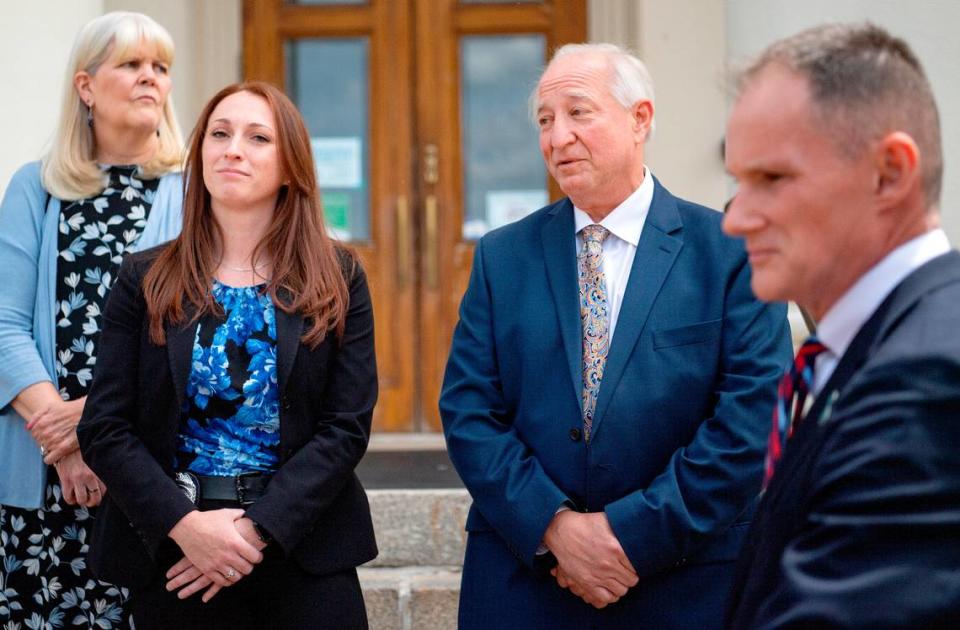Woman confronts her rapist in Centre County courtroom at sentencing. ‘You didn’t break me’
A former Penn State student stood Monday in a packed Centre County courtroom to confront the man convicted of beating and raping her the night before she was set to graduate, an attack carried out with a rarely seen level of violence.
Her tone remained steady when she described the physical and emotional scars she continues to live with, including panic attacks and feelings of anxiety when she’s alone with men or in large crowds.
She occasionally glanced up from the prepared statement and even addressed her attacker by name, but Scott R. Williams didn’t appear to look in her direction.
Instead, he was forced to listen to how he upended her life and ruined a moment she looked forward to since she was a child. It was a statement she waited nearly 30 years to deliver.
“I’ve asked God numerous times why this happened to me. I was angry because (of) missing out on the end of a monumental chapter of my life, missing out on celebrating with my family and friends my accomplishment I had worked so hard for,” she said. “Over the years, I made my peace with God. I feel if there was another woman in the area that night that this could have happened to her. I feel I was the one because God knew I could handle it. He knew I was strong enough to overcome this horrible event and come out even stronger on the other side.”
‘Just short of a homicide’
Williams, 52, of Mifflin County, was sentenced by Centre County Judge Brian Marshall to at least 10 years in state prison. His maximum sentence is 20 years. He received credit for about 2 1/2 months served in the Centre County Correctional Facility.
He declined to offer a statement before his sentence was handed down.

Three current or former State College police detectives with more than a century of experience among them unequivocally said the May 1995 attack along South Pugh Street was the most violent they’d seen.
Former detective Tom Jordan — who investigated about 150 rapes and sexual assaults, as well as upward of 10 homicides — said the woman’s injuries were “absolutely far and above the most serious that I had ever seen.”
Approaching his 45th year in law enforcement, former detective Ralph Ralston offered a similar assessment.
“I have never seen this serious of injury, even in the homicide cases I’ve handled where a victim has been beaten to that extent,” Ralston said. “I think I handled three homicide cases involving bludgeoning and I didn’t see the extent of those injuries like I did in (the woman’s) case.”
Detective Stephen Bosak — the investigator who, along with former detective Nicole Eckley, used genetic genealogy to arrest Williams — said the case was “brutal” and “just short of a homicide.”
A passerby found the woman bloodied and naked from the waist down after she was attacked from behind with a weapon. She was treated for several head and facial fractures at Geisinger Medical Center, where her father had a heart attack next to her bedside.
Detectives used an unusual tactic to keep the case alive long after the normal legal deadline would have expired. They tucked away sexual assault kit samples from the attack in the hope that budding science would one day lead to a match.
Investigators never identified a suspect at the time, but Jordan authored a John Doe arrest warrant against the anonymous DNA in March 2000, about two months before the statute of limitations was to run out.
It was the first time a warrant of that kind was filed in Pennsylvania.
Genetic genealogy — which has emerged in recent years as a powerful tool for identifying suspects who leave DNA at a crime scene — first identified what proved to be Williams’ distant relatives.
They zeroed in on him once they retrieved utensils discarded by a family member at a high school football banquet. They also rummaged through his trash and found bottles that contained his saliva.
The decadeslong investigation was “undoubtedly the finest detective work I’ve seen in my career,” Centre County First Assistant District Attorney Sean McGraw said after Williams was convicted last month.

‘You didn’t break me’
Twenty-two people wrote a letter in support of Williams, many of whom described him as a hardworking father of two boys. He was his family’s only source of income until his arrest.
His wife, Kristi Harper-Williams, said her husband is a “kind, loving father.” Zach Williams, his oldest son, wiped away tears as he said “it’s extremely hard going through this.”
“I just can’t imagine a life without him,” he said.
Longtime friend Tana Traxler’s letter to the judge described Williams as a “role model citizen in our community.” Others wrote they would feel comfortable if he babysat their children; friend and father of two Jonas Hostetler wrote “that’s the trust he has earned from us.”
Defense lawyer Barbara Zemlock used much of her memo to juxtapose Williams’ conduct for much of his adult life against the “violent, horrific, and heinous” crimes for which he was convicted. He was 23 at the time of the attack.
“That the character of the person who is before this Court for sentencing is wholly at odds with that of a person who could commit such a heinous crime cannot be overstated,” she wrote in a memo sent to Marshall. “Mr. Williams’ true character is reflected in his actions and deeds over the past two and a half decades, or so.”
Others who spoke with Bosak as part of the investigation painted a far less glowing picture of Williams.
Several said he had a temper, including a woman who said he had a “short fuse,” with another saying he “intimidates women.” A man who knew Williams from high school described him as “real cocky, real arrogant.”
A woman who dated said Williams never physically or sexually abused her, but said he was “super manipulative” and a “pathological liar.” During an interview with police, Williams even said he “wasn’t the greatest” in his early 20s.
The foundation for it all was his childhood, which Zemlock wrote was riddled with significant trauma. His father beat his older brother to death when he was about 2 years old and his sister also died when she was about the same age.
Williams was born in a Georgia state prison. After his parents were released, he was also beaten by his father and was hospitalized at 18 months old for significant head injuries.
His mother claimed he fell, but he was diagnosed with multiple head and facial trauma, possible fluid on his brain and probable battered child syndrome. A drain was required to relieve swelling in his brain.
Williams’ legal team fought tooth and nail to have evidence and the John Doe warrant tossed out, but were turned away in a crucial pre-trial ruling from Marshall.
Invalidating the warrant, he wrote in his 38-page opinion, would be “placing form over substance.” Williams was found guilty of rape and aggravated assault by Marshall in February after a rare stipulated bench trial.
Zemlock said Monday she plans to appeal.
Williams has consistently said he has no recollection of the attack. Bosak repeatedly suggested to Williams that he may have been intoxicated and the trauma from his childhood triggered the attacks, but he did not budge.
“Maybe I was blackout drunk. I don’t know,” Williams said. “I don’t remember this.”
That position, McGraw said, “strains credibility to the breaking point.”
Some of the 18 people who flooded into the courtroom to support the survivor hugged and wiped away tears after Williams’ sentence was handed down.
Shortly after Williams left in handcuffs, she departed after authoring what could be the final chapter in a book that took nearly three decades to write.
“I couldn’t wait for this day for several reasons, but mainly I wanted you to see me. I wanted you to see that you didn’t break me,” she said. “I had thought about for almost 29 years what I would put into this statement when given a chance. All the anxiety, stress and anger over the past year and the increasing emotions since your arrest is all worth it for this moment, waiting to see what your life will be after this.
“One thing I know: You, Scott, from this point on will be known as a rapist and that will follow you until the day you die. I have been — and will continue to be — known as a survivor and that will follow me until the day I die.”

